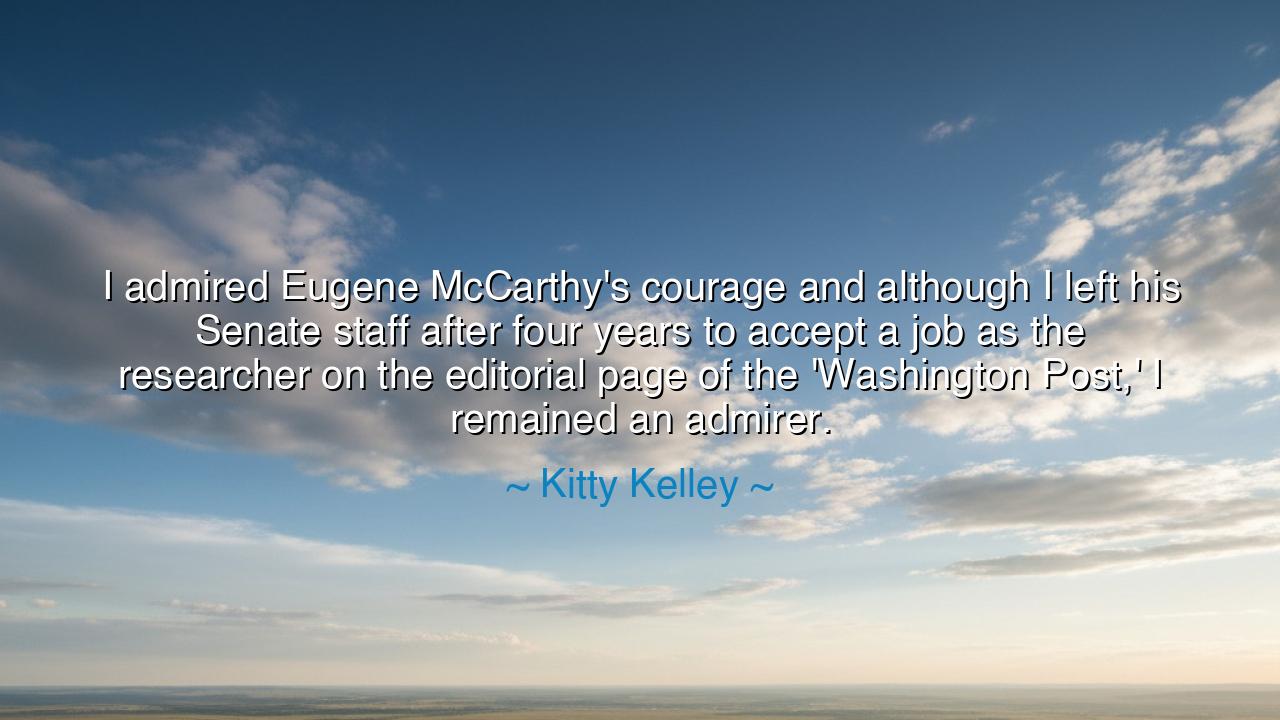
I admired Eugene McCarthy's courage and although I left his
I admired Eugene McCarthy's courage and although I left his Senate staff after four years to accept a job as the researcher on the editorial page of the 'Washington Post,' I remained an admirer.






In an age of political storms and moral testing, Kitty Kelley spoke with reverent simplicity of one who stood firm amid the tempests of history: “I admired Eugene McCarthy’s courage and although I left his Senate staff after four years to accept a job as the researcher on the editorial page of the Washington Post, I remained an admirer.” Within these words lies not merely the reflection of a career, but the echo of a profound truth—that courage, when born of conscience, leaves an imprint on all who behold it. Kelley’s tribute is not only to a man, but to an ideal: the unwavering integrity that dares to speak when silence is safe, and to stand when surrender is easy.
To understand the weight of this admiration, we must return to the era that forged it. Eugene McCarthy, the senator from Minnesota, rose in the 1960s as a voice of dissent against the Vietnam War—a time when opposing the tide meant isolation, ridicule, and political peril. Yet he chose to speak, guided not by ambition, but by conviction. He challenged the sitting president, Lyndon B. Johnson, when few dared to, declaring that conscience demanded resistance to a war that had lost its moral compass. For this act of courage, he became a beacon to a generation weary of violence and deceit.
Kitty Kelley, then a young member of his staff, bore witness to that fire. She saw up close how true courage does not roar in fury, but burns quietly, enduringly, against the winds of fear. When she writes of her admiration, she speaks as one who has stood in the shadow of greatness—not the greatness of power or fame, but of moral strength. Though she left his service to follow her own path, her words reveal that such courage once seen can never be forgotten. The bond between mentor and admirer transcends position; it is the bond between truth and the soul that recognizes it.
To admire another’s courage is itself an act of humility. For it means acknowledging the light in another that we seek within ourselves. Kelley’s reflection reminds us that we are shaped not only by our deeds, but by the examples we choose to honor. In her remembrance of McCarthy, she honors a lineage of those who dared to stand alone—like Socrates, who drank the hemlock rather than betray truth, or Galileo, who whispered “E pur si muove” even as the world silenced him. Such figures teach us that integrity is the true measure of greatness, and that to live with courage is to bear the weight of conviction even when the cost is dear.
And so, Kelley’s quiet confession becomes a moral parable for all who live in times of compromise. In every age, there are those who serve under the powerful, who labor beneath the glare of politics or the machinery of institutions. Many are tempted to trade conscience for comfort. Yet the wise remember the example of people like McCarthy—those who remind us that principle must stand above expedience. To admire such a figure is to keep a fragment of their light alive within our own hearts, guiding us through the dim corridors of our own choices.
Courage, as McCarthy and Kelley both teach, is not the absence of fear but the mastery of it. It is not reckless defiance, but steadfast integrity. The courageous soul does not seek applause, but peace of mind—the knowledge that they have been true to what is right. When we encounter such souls, even briefly, their example lingers like a lamp along our path. Though we may part ways, their presence continues to shape the moral outline of our lives, as McCarthy’s did for Kelley.
Let this be the lesson to those who come after: admire not the loud, but the steadfast; follow not the celebrated, but the sincere. Seek out the ones whose courage flows from compassion and principle, and when you find them, let their example become your compass. For in honoring the brave, you prepare your own heart for bravery.
And so, as Kitty Kelley remained an admirer of Eugene McCarthy, may we, too, remain admirers of all who have the courage to stand for truth in the face of power. Let us not merely praise them, but emulate them—speaking truth when silence tempts us, choosing conscience over comfort, and walking with integrity even when the road is lonely. For such courage, once lived, outlives its moment—it becomes the living legacy of humankind’s better self.






AAdministratorAdministrator
Welcome, honored guests. Please leave a comment, we will respond soon